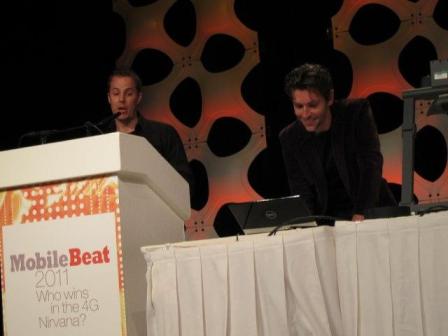
The company did the demo during the MobileBeat Startup Competition, where they were competing in the infrastructure category.
[aditude-amp id="flyingcarpet" targeting='{"env":"staging","page_type":"article","post_id":309176,"post_type":"story","post_chan":"none","tags":null,"ai":false,"category":"none","all_categories":"business,games,mobile,","session":"B"}']“What if you could build Farmville in a week?” asked fast-talking cofounder Clint Walker. “Roar Engine offers a cross-platform, scalable, social game application layer that’s instantly available. We distill the core mechanics of social games into a highly configurable, easy to use system so that game developers can focus on the fun.”
The product targets all game designers, not just engineers, and encourages them to build social games on scalable technology without any upfront development.
AI Weekly
The must-read newsletter for AI and Big Data industry written by Khari Johnson, Kyle Wiggers, and Seth Colaner.
Included with VentureBeat Insider and VentureBeat VIP memberships.
“Essentially, this is social-game-building expertise in a box,” says Walker. “Roar Engine provides reusable social game building blocks wrapped in a configurable cross-platform Web API that lets developers build for iOS, Android, Unity, Flash, HTML5, and others.”
“We’ve focused on solving the backend,” says Walker. “You can write your own API calls. You choose your front end and you can build as much as you want into that.”
Roar Engine is based in San Francisco and is Angel funded. The founders, Walker and Mike Anderson, call themselves “serial entrepreneurs with multiple exits under their belts.” Prior to Roar Engine, the two worked together on Rising Sun Research, an “Oscar winning startup” that was acquired in 2008.
The first major IP built on Roar Engine 1x is Discovery Channel’s “The Deadliest Catch,” a Facebook game. Roar worked with Hive Media to build the back end for the game, which will soon have 100 monthly active users.
A new version is currently in private beta.
Roar Engine is free for games until they reach 100 daily active users. After that, Roar charges for use of the platform. One thousand DAUs averages out to be $110 per month. There’s also a more traditional software licensing model of $125,000 per game (it includes one year of support and upgrades).
[aditude-amp id="medium1" targeting='{"env":"staging","page_type":"article","post_id":309176,"post_type":"story","post_chan":"none","tags":null,"ai":false,"category":"none","all_categories":"business,games,mobile,","session":"B"}']
VentureBeat's mission is to be a digital town square for technical decision-makers to gain knowledge about transformative enterprise technology and transact. Learn More